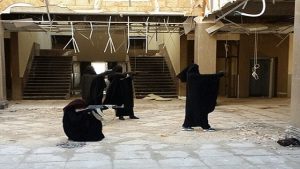When the local media reported the story of eight Indonesian women who managed to flee Syria last month having decided to join the Islamic State (IS) in Iraq and Syria just over a year earlier, the public was yet again served a gentle reminder of the powerful appeal the radical group has for women in Indonesia, like reported by scmp.com.
Just a few months earlier, the Indonesian police foiled IS-inspired suicide bomb attacks by Dian Yulia Novi in Jakarta on December 10, 2016, and Ika Puspitasari in Bali just a few days after. Before their arrests, the two had been set to become Indonesia’s first female suicide bombers.
In neighbouring Singapore, a woman has been detained recently for allegedly attempting to fly to Syria to join IS.
While the presence of women in radical groups is not something new, there has been a notable change in their roles and level of involvement. This change, according to women’s rights activist and gender researcher Lies Marcoes, is “frightening”.
When it comes to women and radicalisation, her words are to be noted. Through an organisation she leads called Rumah Kita Bersama, Lies has followed and interviewed 20 women who are or have been involved with “clear-cut” fundamentalist groups. “Independent”, “educated” and “well-referenced” are just some of the words she uses to describe these “new generations of women jihadis”.
“They want to be visible. They want to be seen. It is clear that they want to take part in the movements,” Lies told This Week in Asia.
She explained that traditionally female jihadis were content with performing “soft jihad”, which was limited to carrying out their reproductive functions such as bearing and rearing children, especially boys, to grow up to become fighters. A prime example of this is Farhana Maute, the mother of the Maute family in the Philippines, whose six sons are all involved in the firefights to seize a number of Philippine towns and cities on behalf of IS.
Some of the younger generation, however, want to break free from the gender stereotype. Lies says that they carry some feminist ideas that look to challenge the patriarchal nature of the jihadist movement and its organisations. The best way of doing this is by duplicating how men show courage by carrying out acts like bank robberies, bomb-making and bomb attacks.
Online engagement
According to the Institute for Policy Analysis of Conflict (Ipac), the increase in women activists is linked to the rise of IS in Iraq in Syria and its global appeal as a “pure” Islamic state which has been facilitated by the use of social media platforms.
A recent report by Ipac titled “Mothers to Bombers: The Evolution of Indonesian Women Extremists” suggests that the prevalence of social media and encrypted chat apps has led to a small but growing number of professional women and Indonesian maids working overseas to become interested in IS.
Dian Yulia, Indonesia’s first would-be suicide bomber, was working as a maid in Taiwan when she first became connected with an IS sympathiser on Facebook who later led her to being acquainted with Indonesia’s leading IS recruiter Bahrun Naim. Likewise, 22 year-old Syaikhah Izzah Al Ansari who became the first Singaporean woman to be detained for suspected Islamic radicalism, was radicalised by online propaganda. She also shared pro-IS material on social media.
In Izzah’s case, the information she received on social media did not only sell her the idea of salvation, but also the prospect of getting married to a militant husband. This idea of a better life presented on social media clearly sells, with women often willing buyers.
Leefa and Nur, two out of the eight Indonesian women that fled from ISIS soon after joining them, said that they had been promised ticket reimbursements, free health treatment and jobs by an IS representative over the internet. But upon their arrival, they found that the situation was different than they had expected, leaving them disappointed and wanting to leave.
Heedless authorities
As a women’s rights activist, Lies said that she was obviously concerned. But the source of her worries is not so much the development of women jihadis, but rather how little is being done to combat the problem.
“There are government institutions and academicians that deal with this issue, but they do not see women as an important part of radical movements,” she said.
Lies says that radicalised women have been the “victims and agents” of Islamic fundamentalism, and a failure to deal with them using a gender analysis approach could prove costly.
Terror analyst Sidney Jones agrees. She believes that the Indonesian intelligence agencies have not paid particular attention to women, despite the fact that women have played key roles.
Continuing to overlook the threat of women jihadis as main actors of terrorist attacks can prove fatal, Sidney said, as extremist groups are turning to women to carry out their big attacks.



